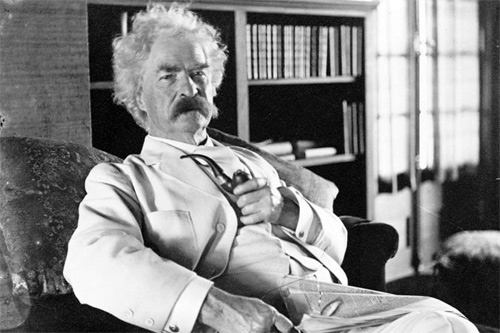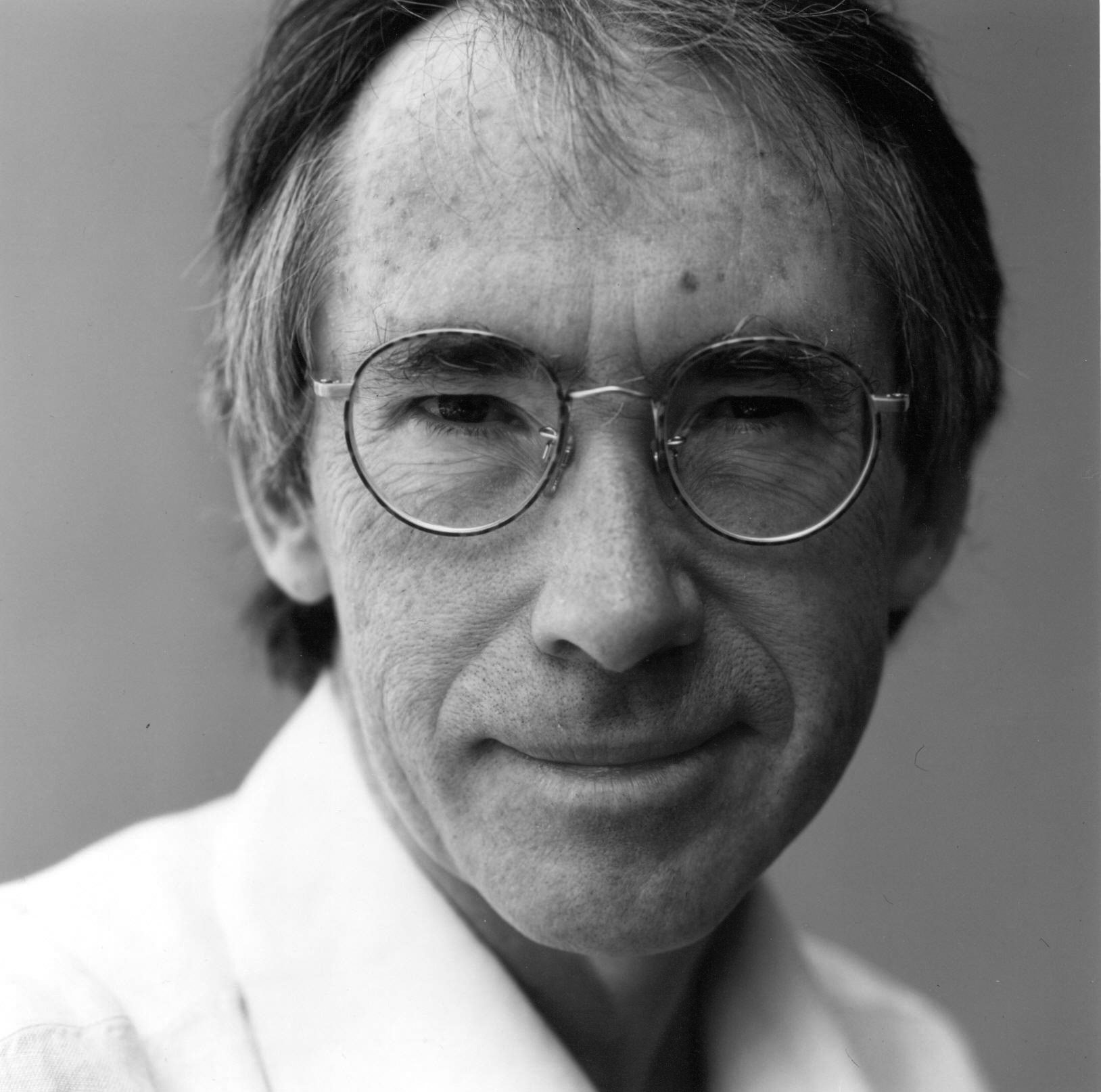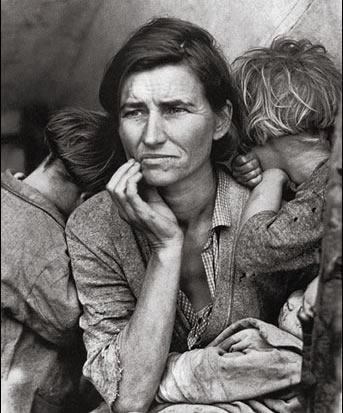Month: September 2009
This week, the American Library Association observes Banned Books Week, an effort at raising awareness about censorship and the freedom to read. Many books have been challenged, or entirely banned, over the years in the United States, including, at various times, Beloved, The Great Gatsby, Catch 22, The Grapes of Wrath, and (my personal favorite) The American Heritage Dictionary, which was removed from a Missouri library in 1978 because it contained “objectionable” words. Interestingly, the most common initiators of book challenges are parents. You can find a list of classics that have been challenged or banned over the years here.

From the essay “Corn-Pone Opinions,” which Twain wrote in 1901 but didn’t publish during his lifetime. It first appeared in print in 1923.
Men think they think upon great political questions, and they do; but they think with their party, not independently; they read its literature, but not that of the other side; they arrive at convictions, but they are drawn from a partial view of the matter in hand and are of no particular value. They swarm with their party, they feel with their party, they are happy in their party’s approval; and where the party leads they will follow, whether for right and honor, or through blood and dirt and a mush of mutilated morals.
In our late canvass half of the nation passionately believed that in silver lay salvation, the other half as passionately believed that that way lay destruction. Do you believe that a tenth part of the people, on either side, had any rational excuse for having an opinion about the matter at all? I studied that mighty question to the bottom — came out empty. Half of our people passionately believe in high tariff, the other half believe otherwise. Does this mean study and examination, or only feeling? The latter, I think. I have deeply studied that question, too — and didn’t arrive. We all do no end of feeling, and we mistake it for thinking. And out of it we get an aggregation which we consider a boon. Its name is Public Opinion. It is held in reverence. It settles everything. Some think it the Voice of God.
You can find the essay online here.
Photo Credit: LAT.

From Joan Didion’s essay “The White Album,” which is on the required reading list for a class I am teaching this fall:
We tell ourselves stories in order to live. The princess is caged in the consulate. The man with the candy will lead the children into the sea. The naked woman on the ledge outside the window on the sixteenth floor is a victim of accidie, or the naked woman is an exhibitionist, and it would be “interesting” to know which. We tell ourselves that it makes some difference whether the naked woman is about to commit a mortal sin or is about to register a political protest or is about to be, the Aristophanic view, snatched back to the human condition by the fireman in priest’s clothing just visible in the window behind her, the one smiling at the telephoto lens. We look for the sermon in the suicide, for the social or moral lesson in the murder of five. We interpret what we see, select the most workable of multiple choices. We live entirely, especially if we are writers, by the imposition of a narrative line upon disparate images, by the “ideas” with which we have learned to freeze the shifting phantasmagoria which is our actual experience.
The essay appears in the collection by the same name.
Photo credit: Village Voice.

Here is a brief excerpt from Ian McEwan’s Atonement, from the scene in which thirteen-year-old Briony laments having written a play for her brother Leon, instead of a short story:
The title lettering, the illustrated cover, the pages bound—in that word alone she felt the attraction of the neat, limited and controllable form she had left behind when she decided to write a play. A story was direct and simple, allowing nothing to come between herself and her reader—no intermediaries with their private ambitions or incompetence, no pressures of time, no limits on resources. In a story you only had to wish, you only had to write it down and you could have the world; in a play you had to make do with what was available: no horses, no village streets, no seaside. No curtain. It seemed so obvious now that it was too late: a story was a form of telepathy. By means of inking symbols onto a page, she was able to send thoughts and feelings from her mind to her reader’s. It was a magical process, so commonplace that no one stopped to wonder at it. Reading a sentence and understanding it were the same thing; as with the crooking of a finger, nothing lay between them. There was no gap during which the symbols were unraveled. You said the word castle, and it was there, seen from some distance, with woods in high summer spread before it, the air bluish and soft with smoke rising from the blacksmith’s forge, and a cobbled road twisting away into the green shade…”
I just started work on a new short story, which, I suppose, is what reminded me of this passage from Atonement.
Photo: Eamon McCabe.

The most recent issue of the London Review of Books includes a thought-provoking cover story by the writer and academic Walter Benn Michaels. The essential argument of “What Matters” is that, while the United States has made some progress in the last forty years in matters of sexual and racial equality, it has remained virtually unchanged when it comes to class inequality.
No group dedicated to ending economic inequality would be thinking today about declaring victory and going home. In 1969, the top quintile of American wage-earners made 43 per cent of all the money earned in the US; the bottom quintile made 4.1 per cent. In 2007, the top quintile made 49.7 per cent; the bottom quintile 3.4. And while this inequality is both raced and gendered, it’s less so than you might think. (…)
An obvious question, then, is how we are to understand the fact that we’ve made so much progress in some areas while going backwards in others. And an almost equally obvious answer is that the areas in which we’ve made progress have been those which are in fundamental accord with the deepest values of neoliberalism, and the one where we haven’t isn’t. We can put the point more directly by observing that increasing tolerance of economic inequality and increasing intolerance of racism, sexism and homophobia – of discrimination as such – are fundamental characteristics of neoliberalism. Hence the extraordinary advances in the battle against discrimination, and hence also its limits as a contribution to any left-wing politics. The increased inequalities of neoliberalism were not caused by racism and sexism and won’t be cured by – they aren’t even addressed by – anti-racism or anti-sexism. (…)
American universities are exemplary here: they are less racist and sexist than they were 40 years ago and at the same time more elitist. The one serves as an alibi for the other: when you ask them for more equality, what they give you is more diversity.
I found the article to be refreshing; I’ve always thought that class is a huge taboo in the United States. It’s rarely ever discussed, and when it is, it’s usually in terms of its interaction with race. But I also think Michaels overstates his points considerably. Take, for instance, the case of the recent arrest of Henry Louis Gates, which Michaels describes thus:
The recent furore over the arrest for ‘disorderly conduct’ of Henry Louis Gates helps make this clear. Gates, as one of his Harvard colleagues said, is ‘a famous, wealthy and important black man’, a point Gates himself tried to make to the arresting officer – the way he put it was: ‘You don’t know who you’re messing with.’ But, despite the helpful hint, the cop failed to recognise an essential truth about neoliberal America: it’s no longer enough to kowtow to rich white people; now you have to kowtow to rich black people too. The problem, as a sympathetic writer in the Guardian put it, is that ‘Gates’s race snuffed out his class status,’ or as Gates said to the New York Times, ‘I can’t wear my Harvard gown everywhere.’ In the bad old days this situation almost never came up – cops could confidently treat all black people, indeed, all people of colour, the way they traditionally treated poor white people. But now that we’ve made some real progress towards integrating our elites, you need to step back and take the time to figure out ‘who you’re messing with’. You need to make sure that nobody’s class status is snuffed out by his race.
Michaels’ assertion that “in the bad old days…cops could confidently treat all black people, indeed, all people of color, the way they traditionally treated poor white people” is simply inaccurate. All other things being equal (which of course they never are, but bear with me for the sake of the argument), race does play a role in the way in which cops treat people. And you don’t need to take my word for it; just look at statistics emanating from police departments in cities like Los Angeles. If a poor white man drove a Rolls Royce in Beverly Hills, he would not necessarily be stopped, while a rich black man might, as famously happened to the lawyer Johnnie Cochran in 1979. The fact remains that racism does play a role that cannot be entirely explained away by an appeal to class. Still, I think the article is interesting, because it explains why the focus on race and sex at the expense of class legitimates disparities and perpetuates prevailing power structures.

I have an essay in the September issue of World Literature Today, on the topic of writing in one’s third language. Here is the opening paragraph:
Not long ago, while cleaning out my bedroom closet, I came across a box of old family photographs. I had tied the black-and-white snapshots, dog-eared color photos and scratched Polaroids in small bundles before moving from Morocco to the United States. There I was at age five, standing with my friend Nabil outside Sainte Marguerite-Marie primary school in Rabat; at age nine, holding on to my father’s hand and squinting at the sun while on vacation in the hill station of Imouzzer; at age eleven, leaning with my mother against the limestone lion sculpture in Ifrane, in the Middle Atlas. But the picture I pulled out from the bundles and displayed in a frame on my desk was the one in which I was six years old and sat in our living room with my head buried in Tintin and the Temple of the Sun.
The essay is available in its entirety online. I hope you enjoy reading it. You can subscribe to WLT here.




